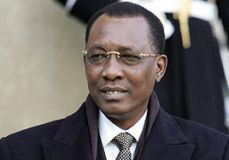Chadian ruling party endorses Deby’s bid for third term
Mar 6, 2006 (NDJAMENA) — The governing party has endorsed beleaguered President Idriss Deby to run for a third term in May elections in the face of increasing political turmoil in the central African country.
 Deby, in power for 16 years, joins a group of African leaders — Uganda’s Yoweri Museveni, Gabon’s Omar Bongo — who have won or are seeking third terms in office after getting their countries’ constitutions amended to allow such contests. The moves have been seen as a blow to democratic progress on a continent long ruled by military strong men and presidents for life.
Deby, in power for 16 years, joins a group of African leaders — Uganda’s Yoweri Museveni, Gabon’s Omar Bongo — who have won or are seeking third terms in office after getting their countries’ constitutions amended to allow such contests. The moves have been seen as a blow to democratic progress on a continent long ruled by military strong men and presidents for life.
At the end of a two-day meeting late Sunday, the Patriotic Salvation Movement endorsed Deby as its candidate at a time when Chad faces heightened border tensions with neighboring Sudan, a rebellion in the east and a dispute with the World Bank over oil revenues.
In his acceptance speech, Deby, 54, called for dialogue with opposition groups.
During the meeting to discuss the party’s candidate and policies for the upcoming presidential elections, the Patriotic Salvation Movement asked the World Bank to reconsider its January suspension of loans.
The World Bank moved after Chad’s parliament voted to change a law governing the use of the country’s oil revenues, releasing more revenues to the government’s general budget instead channeling them to health, education and building Chad’s infrastructure.
The World Bank had helped finance oil industry infrastructure in Chad after the country agreed to observe stringent rules on the use of oil revenues.
Chad first started exporting oil two years ago. Many in Chad fear the oil wealth will be misused, failing to lift the masses out of poverty while sharpening rivalries that have erupted into violence in the past.
At its congress, the ruling party also said that Sudan and Chad should stick to a February agreement to ease tensions and, without specific reference to the eastern Chad rebellion, condemned the taking of power by arms.
Sudan has accused Chad of harboring Darfur rebels, while Chad has said Sudan backs Chadian insurgents. Rights groups have said Chadian and Sudanese militias in Darfur have launched frequent cross-border raids, killing Chadian civilians.
Deby seized power in a 1990 coup after launching a rebellion from bases in Darfur.
In 1991, Deby allowed multiparty politics and parliament passed a new constitution under which, in 1996 and 2001, he won polls marred by controversy.
Last June, Chadians voted in a referendum to lift the two-term limit on Chadian presidents, a result that has been contested by the country’s main opposition parties.
On Friday, the National Independent Electoral Commission said that the next presidential election will be held May 3 and provisional results will be announced May 14.
The commission said new voters will be registered up to March 16 and campaigns for the presidency will last one month, starting April 2.
(ST/AP)
